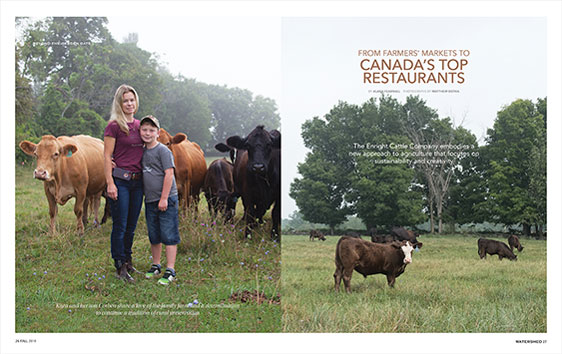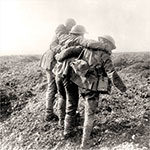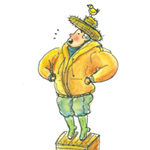
The Enright Cattle Company embodies a new approach to agriculture that focuses on sustainability and creativity
THE SUN IS JUST ABOUT TO SLIP BELOW THE HORIZON as Kara Enright and her son walk up from the lower field. Days are long at Enright Cattle Company. The chores are backbreaking, mother nature can prove difficult at the best of times, and Kara’s phone never stops ringing as she accepts calls from preferred restaurants, orders from a growing farm gate clientele and from customers looking for her leather products.
Kara is a fourth-generation farmer who runs the family beef operation with her husband Darold – also a fourth-generation farmer. Running a farm is no small undertaking but raising a young family and running a sustainable operation that supplies Simmental beef to some of Canada’s best restaurants takes an inordinate amount of energy, patience and unconventional thinking to keep the business growing.
Kara and Darold, along with their children – Corben and Evelyn – and their extended family head up operations at the Enright Cattle Company, a 95-acre beef farm in the heart of Hastings County. In a sea of 1,000-acre corporate farms, the Enrights’ beef farm seems small. But the success of the company isn’t based on size, it’s based on a unique business model that sets them apart from factory farms – a business model built on the foundation of her family’s farming heritage and a determination to run a sustainable operation that produces the highest quality of beef and utilizes as much of the animal as possible – a nose-to-tail way of thinking.
Enright Simmentals are bred and born on the farm, raised on grass until they are weaned, then moved to Kara’s parents’ farm to be raised to market weight. Between the two farms, the Enrights plant, grow and harvest all the crops needed to feed the cattle. Their beef is free from artificial hormones and antibiotic residue.
In the early years, Kara and Darold recognized the need to differentiate their beef farm from other operations that simply “shipped a weaned calf to the sales barn”. They decided to take their beef directly to customers who frequented farmers’ markets.
“I was pretty näive at that time; I thought you just signed up and paid your fee and showed up. It’s actually very difficult to get into farmers’ markets, especially the ones that are bigger and rolling through more volume of product,” recalls Kara.
The farmers’ markets provided an invaluable opportunity to develop relationships. “It allowed us to interact with the customer and find out exactly what they were looking for, and what we needed to do to meet their needs,” says Kara.
While the farmers’ markets kept Kara and Darold busy, the business wasn’t growing as consistently as they had hoped. That is, until one market morning, when a customer happened upon their booth. That customer turned out to be the chef from the well-respected Kingston restaurant, Le Chien Noir. Over time, Enright Cattle Company became a preferred supplier for Le Chien Noir.
The Enrights reasoned that if one restaurant was interested in their local beef, why wouldn’t others be?
“I started introducing myself to some of the other chefs and owners… and it just kind of evolved from that,” adds Kara.
Word of the quality of the Enrights’ cattle spread like gossip on a party line. The Enrights had tapped into a new market, one in which chefs and restaurateurs shared the Enrights’ belief that “high quality, locally-sourced food is the heart of a sustainable food system”. The Enrights continued to build on their brand, keeping lines of communication open with the chefs and restaurateurs who appreciated their product, and worked with them to develop new recipes and to try different cuts of beef.
This regular interaction with the culinary industry helped secure orders from a number of Canada’s top restaurants, including Ottawa-based Atelier and Stofa, as well as Toronto’s Actinolite. All three of these establishments are on the list of Canada’s Best 100 Restaurants with Enright Cattle Company beef featured prominently on their menus.
But the Enrights didn’t stop there.
“Our philosophy has always been to utilize as much of the animal as possible and to add value wherever possible. We’re not large producers; we don’t have thousands of cattle and we’re limited in the amount of land we have access to.” Kara says, “We’re trying to make our business work by adding as much value and utilizing as much of the carcass as possible without having to be a large operation.”
This philosophy led to the development of a leather business which uses the hide of their cattle to create handcrafted leather products in partnership with Canadian artisan James M. Brooks.
Kara and Darold represent a new approach to agriculture with an emphasis on entrepreneurial thinking. They adapted the traditional farm model, then used their knowledge, determination and creativity to focus on a niche market.
And as the sun sets on another long day where unspoiled forest meets pasture, the Enrights can rest assured of the continued success of the family farm. Read more about the Enright Cattle Company at enrightcattlecompany.com.
Story by:
Alana Fearnall




